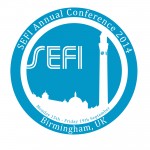Posted in 2014
SEFI2014: Understanding social learning behaviours of xMOOC completers
 Paper presented at the SEFI Conference 2014 in Birmingham, UK.
Paper presented at the SEFI Conference 2014 in Birmingham, UK.
This paper is about the experiences with the first two MOOCs developed and executed at the Delft University of Technology (TUD) on the edX platform. The courses Solar Energy (ET3034TU) and Introduction to Water Treatment (CTB3365) have a long tradition at the TUD as regular campus courses with a good reputation worldwide. The focus of Solar Energy was on the discovery of solar energy power and the design of a complete photovoltaic system. This was done by introducing the students to the technology for the conversion of solar energy into electricity, heat and solar fuels with a main focus on electricity generation. The focus of the Water Treatment course was to learn about urban water services, including basic drinking water and wastewater treatment technologies. These two treatment chains were described as well as the physical, chemical and biological processes involved. The emphasis was on water quality and the functionality of each unit process within the treatment chain. In relation to their “MOOC”-characteristics, similarly to many other xMOOCs, these two DelftX courses had low completion rates, “knowledge-acquisition” approach to learning design, and relatively low forum activity.
Reference
De Vries, P., Hennis, T., Skrypnyk, A., (2014). Understanding social learning behaviours of xMOOC completers (paper ID 66) in Proceedings of SEFI Annual Conference 2014. ISBN: 978-2-87352-004-5
Download
Download paper Skrypnyk Hennis De Vries 2014 Understanding social learning behaviours of xMOOC completers – SEFI 2014 conference proceedings
THEMA Hoger Onderwijs 2014: Achter de schermen van moocs
Samenvatting
De TU Delft is dit academisch jaar (2013/14) begonnen met het aanbieden van massive open online courses (moocs) via edX; een open source leerplatform ontwikkeld door MIT en Harvard, waarvan intussen de TU, maar ook Stanford en een veertigtal andere universiteiten wereldwijd gebruik maken. Dit artikel gaat over de vraag wat een mooc is, waarom de TU deze aanbiedt, wat voor inspanningen het kost om zo’n mooc te maken en welke ervaringen zijn opgedaan. Voor een deel komt die kennis uit de analyse van de grote hoeveelheid data, die de vele gebruikers van zo’n mooc genereren, in dit geval twee TU-moocs, die in november 2013 zijn afgerond. Er is veel discussie en beweging rond open onderwijs en de uitkomst is nog moeilijk te voorspellen. In deze situatie is het devies van de TU ‘Learn and lead’.
Reference
Pieter de Vries, Joost Groot Kormelink, Thieme Hennis. Achter de schermen van moocs in THEMA Hoger Onderwijs 2014, nummer 1: MOOCs in het Hoger Onderwijs.
Download
Download paper from website (behind login)
